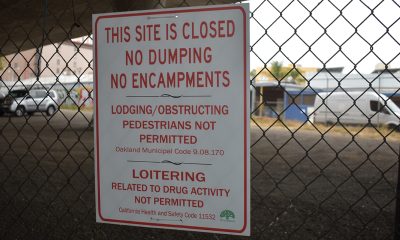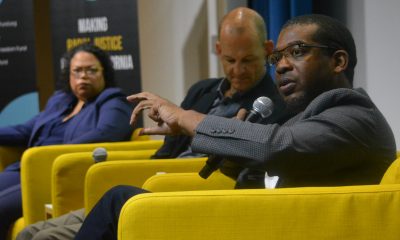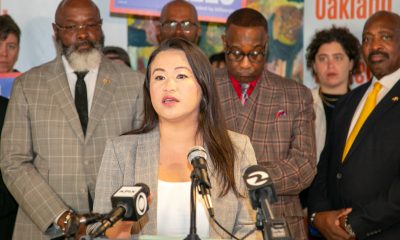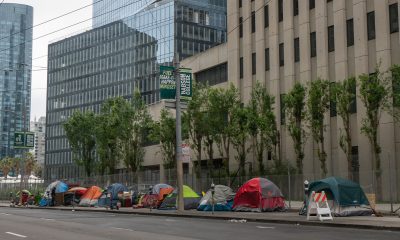Alameda County
2024 Local Elections: Q&A for Oakland Unified School Board Candidates, District 7
For the first time in California’s history, 16- and 17-year-olds in Oakland will be able to vote in their respective school board elections in November 2024. This initiative is a collaborative effort by the County of Alameda, the City of Oakland, and the Oakland Unified School District. The Post reached out to the eight candidates across Districts 1, 3, 5, and 7 to see what their views are on various topics concerning the OUSD community. Below are questions and answers from District 7 candidate Clifford Thompson. Dominic Wares, the other D7 candidate, did not respond to multiple requests for written or over-the-phone responses.

By Magaly Muñoz
In a few weeks, Oakland residents will vote for new school board directors in four separate districts across the city.
For the first time in California’s history, 16- and 17-year-olds in Oakland will be able to vote in their respective school board elections in November 2024. This initiative is a collaborative effort by the County of Alameda, the City of Oakland, and the Oakland Unified School District.
The Post reached out to the eight candidates across Districts 1, 3, 5, and 7 to see what their views are on various topics concerning the OUSD community. Below are questions and answers from District 7 candidate Clifford Thompson. Dominic Wares, the other D7 candidate, did not respond to multiple requests for written or over-the-phone responses.
Responses by Thompson have been edited for length and clarity.
Q1: What do you think the biggest challenge will be to address while on the board?
I think a continuation of a problem is going to make sure that we operate within our budget constraints. We’re looking at getting out of receivership and having our last bill paid off in June of 2026, but it scares me. If you look at the multiple-year projection, it shows that we’re going to be deficient some money, which means that if we don’t make the proper cuts that we should make now in order to balance the budget, we’ll still be in a deficit mode in the future, which means that we might have to get the state to bail us out again. If we go back into receivership, then we become necessarily a lame duck board with decisions being made by the state.
But number two is getting the board to focus on the major issue, which is making sure that our students graduate with flexibility [and with options]. Another challenge that’s facing us is a lot of students saying that their social, emotional character has been affected by COVID-19. The pain is a mental pain, not necessarily a physical pain, but because it’s a mental pain, it affects how kids show up physically. We, as a board, have to focus on minimizing the effect of the pandemic isolation time the kids were facing.
Q2: Given the large financial debt OUSD has and the looming threat of school closures, how will you ensure that funding for essential resources remain for students? What ideas do you have that do not include closing down schools?
We’re looking at not just closing schools, we’re looking at all of the avenues that we can actually pursue in order to balance the budget so that we don’t have to close schools. Closing schools is just one option.
I think a number of people in the community think that the board wants to close schools, but the board doesn’t necessarily want to close schools. We want to do what’s necessary to make the district whole so that the district keeps functioning and we don’t have to take out a loan from the state. We want to make sure that we’re operable as a successful district, giving all of the opportunities to kids that they need, making sure that we address union issues so that we’re compliant when it comes to the OEA (Oakland Education Association), and making sure that we’re hearing the voices from the community in terms of what they feel they need at that time. We want to look at everything and see how we can best leverage whatever opportunity we have in order to make sure that we operate in the black and not in the reds.
Q3: Students have reported feeling as though there is not enough inclusivity amongst their peers, often feeling a divide with those of other race and ethnic backgrounds. What do you think is the best way to foster an environment where students are not feeling excluded because of their background and differences to peers?
What needs to happen is voices need to be given to each person, and you need to value whatever their contribution is. When you exclude kids and you don’t allow their voice to be heard, then you’re in essence saying, ‘I don’t value what you have to say.’
Sometimes you have to go out of your way just to make sure that certain groups are at the table. For instance, if a person has a problem with people of color, you need to make sure you have people of color at the table, and you need to encourage those individuals to voice their opinion. You have to make sure you provide a seat at the table, but then you have to lower their affective filter so that they can actually voice their opinion when they’re at the table.
Alameda County
Access Better Health with Medically Tailored Meals – Transforming Health Through Nutrition for Medi-Cal Patients
Launched in 2018, the Medically Tailored Meals pilot program was designed to help Medi-Cal patients with congestive heart failure by reducing hospital readmissions and emergency department visits by providing tailored meals meeting specific dietary needs. The program’s success in improving health outcomes and reducing costly emergency room visits encouraged the Department of Health Care Services (DHCS) to expand the Medically Tailored Meals program to all 58 counties through Medi-Cal transformation and a new set of services called Community Supports.

Advertorial
Launched in 2018, the Medically Tailored Meals pilot program was designed to help Medi-Cal patients with congestive heart failure by reducing hospital readmissions and emergency department visits by providing tailored meals meeting specific dietary needs.
The program’s success in improving health outcomes and reducing costly emergency room visits encouraged the Department of Health Care Services (DHCS) to expand the Medically Tailored Meals program to all 58 counties through Medi-Cal transformation and a new set of services called Community Supports.
Medically Tailored Meals are one of 14 new services offered through Medi-Cal that provide members with access to new and improved services to get well-rounded care that goes beyond the doctor’s office or hospital.
Medically Tailored Meals: Overview
Malnutrition and poor nutrition can lead to severe health outcomes, especially among Medi-Cal patients with chronic health conditions. Medically Tailored Meals aim to improve health outcomes, reduce hospital readmissions, and enhance patient satisfaction by providing essential nutrition.
Key Features:
- Post-Discharge Delivery: Meals are delivered to patients’ homes immediately following discharge from a hospital or nursing home.
- Customized Nutrition: Meals are tailored to meet the dietary needs of those with chronic diseases, designed by registered dietitians (RD) or certified nutrition professionals based on evidence-based guidelines.
- Comprehensive Services: Includes medically tailored groceries, healthy food vouchers, and food pharmacies.
- Educational Support: Behavioral, cooking, and nutrition education is included when paired with direct food assistance.
Key Benefits:
- Address Food Insecurity: Mitigates poor health outcomes linked to food insecurity.
- Support Complex Care Needs: Tailored to individuals with chronic conditions.
- Improve Health Outcomes: Studies show improvements in diabetes control, fall prevention, and medication adherence.
Patient Testimonial:
“My diabetes has gotten better with the meals. I’ve kept my weight down, and I feel much better now than I have in a long time. I’m one of the people this program is meant for.” — Brett
Eligibility:
- Eligible Populations: Eligible Medi-Cal members include those with chronic conditions like diabetes, cardiovascular disorders, congestive heart failure, stroke, chronic lung disorders, HIV, cancer, gestational diabetes, and chronic mental or behavioral health disorders. Also, those being discharged from a hospital or skilled nursing facility or at high risk of hospitalization or nursing facility placement are also eligible.
- Service Limitations: Up to two meals per day for up to 12 weeks, extendable if medically necessary. Meals eligible for reimbursement by alternate programs are not covered.
Cost Savings and Improved Health Outcomes:
- Health Outcomes: Research indicates a 22% to 58% decrease in emergency department visits and a 27% to 63% decrease in inpatient admissions among Medically Tailored Meals recipients, translating to significant health care cost savings.
Project Open Hand: A Success Story
Project Open Hand has been a leader in providing Medically Tailored Meals, significantly impacting the lives of Bay Area Medi-Cal patients with chronic illnesses. Since its inception, Project Open Hand has delivered nutritious meals to individuals with diabetes, HIV, and other serious health conditions, demonstrating remarkable health improvements and cost savings.
Key Achievements:
- Improved Health Outcomes: Project Open Hand’s research found a 50% increase in medication adherence among recipients of Medically Tailored Meals.
- Reduced Hospitalizations: Their program showed a 63% reduction in hospitalizations for patients with diabetes and HIV.
- Enhanced Quality of Life: Patients reported better health and increased energy levels.
Project Open Hand ensures that each meal is prepared using fresh, wholesome ingredients tailored to meet the specific dietary needs of its clients. By partnering with Medi-Cal managed care plans, Project Open Hand continues to provide life-saving nutrition to those who need it most.
Join Us in Our Mission
You can experience the profound impact of Medically Tailored Meals by joining the Medi-Cal Community Supports services initiative. Your involvement can make a difference in promoting your health through nutrition.
Learn More
For more information about Medically Tailored Meals and how to get involved, call the state’s Medi-Cal Health Care options at 800-430-4263 or contact your local managed care plan.
In Alameda County, Medi-Cal recipients can contact:
* Alameda Alliance for Health: 510-747-4567
* Kaiser Permanente: 855-839-7613
In Contra Costa County, Medi-Cal recipients can contact:
* Contra Costa Health Plan: 877-661-6230
* Kaiser Permanente: 855-839-7613
In Marin County, Medi-Cal recipients can contact:
* Partnership Health Plan of California: 800-863-4155
* Kaiser Permanente: 855-839-7613
In Solano County, Medi-Cal recipients can contact:
* Partnership Health Plan of California: 800-863-4155
* Kaiser Permanente: 855-839-7613
Your health and well-being are your health care provider’s top priority. Medically Tailored Meals are designed to enhance quality of life by advancing health care through the power of nutrition. Experience the benefits today, and take the first step toward a healthier you.
Alameda County
2024 Local Elections: Q&A for Oakland Unified School Candidates, District 5
The Post reached out to the eight candidates across Districts 1, 3, 5, and 7 to see what their views are on various topics concerning the OUSD community. Below are questions and answers from District 5 candidate Patrice Berry. Sasha Ritzie-Hernandez, the other D5 candidate, did not respond to requests for written or phone interview responses.

By Magaly Muñoz
In a few weeks, Oakland residents will vote for new school board directors in four districts across the city.
The Post reached out to the eight candidates across Districts 1, 3, 5, and 7 to see what their views are on various topics concerning the OUSD community. Below are questions and answers from District 5 candidate Patrice Berry. Sasha Ritzie-Hernandez, the other D5 candidate, did not respond to requests for written or phone interview responses.
Responses have been edited for length and clarity.
Q1: What do you think the biggest challenge will be to address while on the board?
Berry: The very biggest challenge for the board is probably balancing the budget in the short term while also establishing a plan for fiscal sustainability. It’s worth noting that in addition to our fiscal challenges, OUSD faces these big challenges: low literacy, math, and postsecondary readiness performance and public safety. Another opportunity includes improving student and educator well-being.
Q2: Given the large financial debt OUSD has and the looming threat of school closures, how will you ensure that funding for essential resources remain for students? What ideas do you have that do not include closing down schools?
Berry: First, I would love to work with other school board members, the superintendent, students, families, educators, and others to identify a set of budget scenarios that do not include school closures because our unique school communities are often also essential resources for students and families. To protect funding for essential resources for students, we have to consider strategies to reduce costs [such as] eliminating redundancies and inefficiencies, as well as opportunities to increase revenue.
One of my first priorities will be to work with colleagues and our communities to identify other sources of revenue that could generate income in the immediate future, over time, and in the long term. Potential sources of new revenue include leasing land to develop affordable housing or housing for educators we want to attract and retain in the district, renting or leasing space to maximize the use of underutilized buildings for community-driven programs and services, and tapping into county and state grant programs dedicated to mental health and wellness, violence prevention, homelessness prevention and other major challenges that impact education.
Q3: Students have reported feeling as though there is not enough inclusivity amongst their peers, often feeling a divide with those of other race and ethnic backgrounds. What do you think is the best way to foster an environment where students are not feeling excluded because of their background and differences to peers?
Berry: First, I think inclusivity is something that should be prioritized and developed into the DNA of a school community even when there is a sense that exclusion does not exist or isn’t prevalent. Sometimes, students experiencing exclusion also experience the marginalization of their voices such that to others, it may not be readily obvious that it’s happening.
Second, one of the best ways to foster an environment where students do not feel excluded is to get to know and understand our students, which is inherently valuable but also absolutely necessary in order to develop responsive learning communities that embrace all of our young people. I have had so many students tell me that one of the things they desire the most is listening and genuine curiosity. If we work with students to build a culture of listening and curiosity, we’re also likely to create a culture where differences are considered opportunities instead of challenges.
I also think student leadership helps build safe spaces for students, and representation among educators is also critical [because] they represent the diversity of our students. The more our learning environments reflect the diversity of our students and their experiences and perspectives, the more likely all of our students will feel a deep sense of belonging.
Activism
Oakland’s Asian Community Rallies Against Recall of Mayor Sheng Thao
Thao was speaking at a rally Oct. 15 in Oakland Chinatown, backed by about 100 supporters. “Oakland has seen unprecedented challenges during and since the pandemic, Thao said. “But I stand with you today to tell you that “Oakland has seen 14,000 less crimes this year than last year. This year, we’re headed on the right track,” with fewer homicides than in 2019. “We are saving lives in Oakland. What we are doing work,” she said.

“We’re saving lives in Oakland. What we are doing works,” said Mayor Thao
By Ken Epstein
Self-assured and defiant, Mayor Sheng Thao strongly defended her achievements during her first two years as mayor and went on the offensive against billionaires who are funding the recall campaign against her.
Thao was speaking at a rally Oct. 15 in Oakland Chinatown, backed by about 100 supporters.
“Oakland has seen unprecedented challenges during and since the pandemic, Thao said. “But I stand with you today to tell you that “Oakland has seen 14,000 less crimes this year than last year. This year, we’re headed on the right track,” with fewer homicides than in 2019. “We are saving lives in Oakland. What we are doing work,” she said.
Local community and business leaders supporting Thao spoke at the rally, too, which was held in the courtyard of the Pacific Renaissance Plaza in Chinatown. They pushed back on corporate media portrayals of Chinatown residents living in fear of rampant crime and united in opposition to Thao.
“The billionaires, the millionaires, are going to want to tell you that it’s not working and that somehow you shouldn’t believe the data,” Thao continued. “(However) the data shows that we are saving lives. That is a huge win. It’s not good enough. But it’s a place where we’re proud to start from.”
“You know who is behind this recall. It is majority funded by one executive (of a) hedge fund who doesn’t even live in Oakland. He does not care if this brings Oakland into chaos, because that’s exactly what his recall will do. Imagine a city with no leadership (for many months),” added Thao.
Another speaker, Stewart Chen, owner of a small business in Chinatown and a prominent political leader, has taken a strong stand against the recall.
“Mayor Thao (was) in office for less than two months before the recall started. I think it’s unfair. She hasn’t had time to prove her policies and her leadership,” Chen said.
“(Only) two months. That is not democratic. She campaigned hard and was duly elected, -justly, legally, democratically,” he said.
“The Chinatown community, we’re all here, (because) we want to see Mayor Thao (here) for the next two years” to complete her term, Chen said.
Other speakers included Kenneth Tang, organizing director of Asian Pacific Environmental Network (APEN) Action – who said he and other APEN Action members came to the rally because, “We support Mayor Thao.”
Elaine Peng, president of Asian Americans for Progressive Alameda, (AAPA) brought out people to the rally. Her organization is also actively working to elect U.S. Vice President Kamala Harris.
Mariano Contreras of the Latino Task Force and a leader of the “Respect Our Vote – No Recalls!” coalition, said, “There was a time when African Americans could not vote. There was a time when Asians could not vote. There was a time when Latinos could not vote. That was called voter suppression. This is another form of voter suppression. We already cast our ballot for Mayor Sheng Thao. Please, vote ‘no’ on the recall.”
-

 Bay Area4 weeks ago
Bay Area4 weeks agoFormer Mayor Willie L. Brown Endorses Dana Lang for BART Board District 7
-

 Bay Area4 weeks ago
Bay Area4 weeks agoMayor Sheng Thao Issues Executive Order to Shut Down Homeless Encampments
-

 California Black Media4 weeks ago
California Black Media4 weeks agoStudy: UC 4-Year Grad Rate Doubles That of CSU
-

 Alameda County4 weeks ago
Alameda County4 weeks agoAlameda County Democratic Party Opposes the Recall of Mayor Sheng Thao
-

 Bay Area4 weeks ago
Bay Area4 weeks agoState of Black California: Oakland Tour Stop Rescheduled
-

 Business4 weeks ago
Business4 weeks agoGoogle’s New Deal with California Lawmakers and Publishers Will Fund Newsrooms, Explore AI
-

 Bay Area4 weeks ago
Bay Area4 weeks agoOakland Xi Gamma Omega Honors the Chapter’s First Regional Director
-

 Bay Area4 weeks ago
Bay Area4 weeks agoA’s Last Game in Oakland Ends Baseball Team’s 57-Year Tenure Congresswoman Barbara Lee’s Efforts to Save Team Blocked by GOP-Controlled House





























































